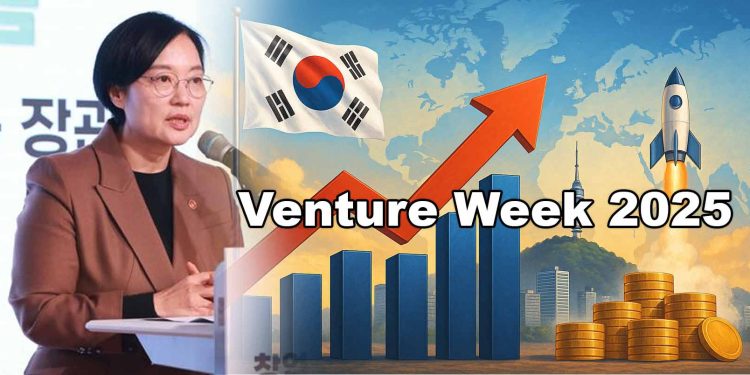Korea’s startup scene is about to pause, reflect, and reimagine its future. In the coming first venture week, the nation’s venture and innovation builders, investors, and policymakers will stand on a single stage to redefine what innovation means after 30 years of progress. The week ahead is not only about celebration, but also about designing how Korea will compete in the next global venture era.
Venture Week 2025: A National Stage for Korea’s Venture Future
The coming week of November 26–December 2, 2025, is setting a milestone moment as Korean government inaugurates the first-ever “Venture Week” — a nationwide initiative celebrating 30 years of Korea’s venture system and 20 years of the national Fund of Funds (Mother Fund).
Beyond a simple commemoration, this event marks the beginning of a strategic transformation designed to propel Korea into the world’s top four venture powerhouses.
Over the next seven days, 30 official events will unfold across the country: SME and Venture M&A Conference, Venture 1 Trillion Won Ceremony, Korea VC Awards 2025, AC Boom-Up Concert, and the Venture 30th Anniversary Ceremony.
The program is jointly organized by the Ministry of SMEs and Startups (MSS), the Korea Venture Business Association (KOVA), Korea Venture Investment Corp. (KVIC), Korea Venture Capital Association (KVCA), and Korea Technology Finance Corporation (KIBO).
30 Years of Growth, One Unified Ecosystem
For the first time in Korean venture history, the government and private sector are jointly hosting a legally proposed national commemorative week dedicated to innovation-driven enterprises.
While other industries — such as SMEs and mid-sized firms — already had institutionalized celebration weeks, the venture community had long sought formal recognition of its economic role.
Yet, what makes this celebration the most symbolic is the timing itself. Since the enactment of the Venture Business Act in 1997, Korea’s ecosystem has grown from a handful of early-stage firms into a globally recognized innovation hub. The launch of the Fund of Funds (2005), TIPS program (2013), Regulatory Free Zones (2019), Unicorn Project (2020), and Venture Investment Promotion Act (2020) collectively shaped what is now called “K-Venture.”
This year’s Venture Week bridges that legacy with the next chapter — aligning with the forthcoming “Four-Pillar Global Venture Powerhouse Strategy.”
Government Plans: “Four-Pillar Global Venture Powerhouse Strategy”
During Venture Week, the government is expected to announce a comprehensive policy blueprint aimed at expanding Korea’s global competitiveness in startup innovation.
The plan, tentatively titled “Four-Pillar Global Venture Powerhouse Strategy,” has been developed through months of consultation with startup founders, VCs, ACs, and regional ecosystem experts. And the proposed pillars include:
1. Expanding Venture Capital Supply
Strengthening the Fund of Funds, activating secondary markets, and supporting liquidity through the KOSDAQ and venture exchanges.
2. Fostering New Industries
Targeted support for deep tech, AI, biotech, and semiconductor startups to solidify Korea’s global technological leadership.
3. Scaling Global Market Access
Structuring systematic support for cross-border expansion, trade partnerships, and co-investment with global funds.
4. Upgrading Innovation Infrastructure
Advancing TIPS, Regulatory Free Zones, entrepreneurship education, and regional venture infrastructure to enhance inclusivity.
This initiative coincides with internal discussions to restructure government governance around venture policy, possibly establishing a unified national-level body overseeing venture growth strategy.
Inside Korea’s First Venture Week: Policy, Capital, and Future Vision
Minister Han Seong-sook underscored the symbolic and strategic importance of the milestone:
“For 30 years, K-Venture has continuously pioneered new paths and driven Korea’s innovation. The history of challenge and achievement must now be carried forward by youth and future generations.”
She added,
“Venture Week will grow into Korea’s flagship innovation festival — a place where the venture spirit blossoms, empowering startups to take bold steps and expand into global markets.”
Industry leaders share cautious optimism that this institutionalization could catalyze a “third venture boom.” One investment executive noted that the scale and coordination of this year’s agenda reflect a shift toward long-term policy integration rather than isolated funding programs.
How Venture Week 2025 Signals a New Era for Korean Startups
The launch of Venture Week 2025 signals more than celebration — it represents Korea’s intent to institutionalize its innovation narrative. Over three decades, K-Venture has proven its capacity to turn state policy, private capital, and entrepreneurial risk into a virtuous cycle of innovation.
Yet, the next challenge is systemic. Because moving forward, South Korea must be able to bridge regional gaps, reform venture governance, and create global linkages that position its startups at the forefront of the AI, semiconductor, and green-tech revolutions.
If the Four-Pillar Strategy succeeds, Korea could transition from a fast-follower ecosystem into a global venture architect — shaping how nations design policies that integrate risk capital, innovation policy, and sustainable entrepreneurship.
What Korea’s Four-Pillar Venture Strategy Means for Global Investors
In the end, the first Venture Week in 2025 will close one chapter and open another. It acknowledges Korea’s journey from post-crisis innovation policy to global startup competitiveness while defining how the nation will move toward sovereign venture resilience in the decade ahead.
And eventually, it sends strong signal for global policymakers and founders, that the next 30 years of Korean innovation will not only be about startups building companies — but about a nation building ecosystems that endure.
– Stay Ahead in Korea’s Startup Scene –
Get real-time insights, funding updates, and policy shifts shaping Korea’s innovation ecosystem.
➡️ Follow KoreaTechDesk on LinkedIn, X (Twitter), Threads, Bluesky, Telegram, Facebook, and WhatsApp Channel.






